Within the fabric of Pakistan’s rich cultural tapestry lie the stories of numerous unsung heroines, whose influence extends far beyond their homeland’s borders. Their stories stand as a testament to the resilience, intellect, and unwavering determination of women who, amidst societal constraints, managed to blaze trails, challenge norms, and inspire generations. Moreover, their contributions span diverse domains, ranging from education and human rights to literature, art, and beyond. Yet, their narratives have remained obscured, often relegated to the margins of history textbooks. Their achievements resonate not only within the context of Pakistan but resonate with universal themes of empowerment, equality, and human potential. Through the lenses of these forgotten heroines, we gain a profound understanding of how individual courage can propel societies toward transformation. In a world where representation and recognition are vital, it becomes imperative to celebrate the voices that have historically been muted. This blog is a tribute to the women who defied conventions, shattered barriers, and proved that even within the most challenging circumstances, the spirit of change and impact knows no bounds.
Fatima Begum (1890-1958)
Fatima Begum, the daughter of Molvi Mehboob Alam, played a pioneering role in educating Muslim girls across the subcontinent. Her notable achievements include being India’s first female Muslim journalist. She held the esteemed position of editor for women’s magazines like ‘Sharif Bibi,’ ‘Asmat ‘and ‘Khatun.’ The objectives of these magazines were to provide mental, moral, and political training for Muslim women, fostering a supportive environment for women’s education. These publications drew from the Holy Quran, Hadis, and Western traditions to advance their arguments. When Quaid-i-Azam issued the call, Fatima Begum promptly organized the Frontier Women, motivating both men and women to actively join the struggle for Pakistan and educate the Muslim masses on the present crucial issues. Her contributions extended beyond Punjab, as she dedicated her efforts to the betterment of Muslims throughout India, actively supporting victims of the Bihar riots.
Undoubtedly, it can be affirmed that the concerted efforts of lesser-known yet unwavering and altruistic individuals like Fatima Begum were pivotal for the Muslim League and Quaid-i-Azam during the monumental task of Pakistan’s creation. She stands prominently among the unsung heroes of the Pakistani movement, contributing through her welfare initiatives, written works, and educational institutions. Moreover, her personal activism and consistent engagement in public discourse and political movements exemplify her profound impact on shaping the course of the movement. Without such devoted figures, the realization of Pakistan’s vision might have remained a distant aspiration.
Begum Shaista Suharwardy Ikramullah (1915-2000)
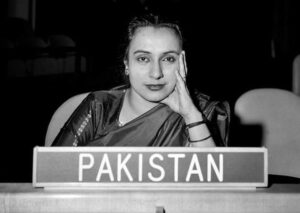
Begum Shaista Suharwardy Ikramullah stands as an exemplary figure among the women who actively participated in the Pakistan Movement. Beyond her profound contributions, she holds the distinction of being the first Muslim woman to earn a Ph.D. from the University of London. A trailblazer in every sense, Begum Shaista was one of the two female representatives in Pakistan’s inaugural Constituent Assembly. Her dedication to public service didn’t end there; she later assumed the role of Pakistan’s ambassador to Morocco, a testament to her diplomatic acumen.
Her influence extended to international forums as well. As Pakistan’s delegate to the United Nations, Begum Shaista played a pivotal role in shaping the Universal Declaration of Human Rights. Her tireless efforts bore fruit with the inclusion of Article 16, which addresses ‘equal rights in marriage.’ This momentous achievement remains a testament to her unyielding commitment to gender equality. With a rich literary legacy, Begum Shaista authored three books in Urdu and five in English, covering a diverse range of subjects. Her intellectual prowess and dedication to education left an indelible mark on the literary landscape. In recognition of her exceptional contributions, Begum Shaista Suharwardy Ikramullah was bestowed with the prestigious Nishan-e-Imtiaz Award. Her legacy as a diplomat, author, and advocate for gender equality continues to inspire generations, underscoring the transformative impact of her lifelong dedication to progress and change.
Mukhtaran Mai
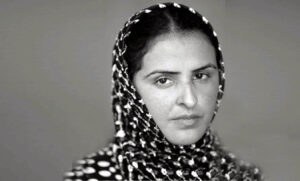
Mukhtaran Mai, an unsung heroine of Pakistan, is a beacon of resilience, courage, and advocacy in the face of adversity. Born in a small village in Punjab, she became a symbol of strength and empowerment after surviving a brutal gang rape in 2002. Rather than succumbing to silence, Mukhtaran defied societal norms by seeking justice and raising her voice against the injustices she endured. Her relentless pursuit of justice not only led to the conviction of her assailants but also sparked a national and international dialogue on gender-based violence and women’s rights in Pakistan. Moreover, her ordeal prompted her to establish the Mukhtaran Mai Women’s Welfare Organization, providing support and empowerment to survivors of sexual violence.
Despite facing threats, opposition, and cultural barriers, Mukhtaran remains an unyielding advocate for women’s rights, education, and gender equality. Her journey from victim to activist has inspired countless individuals, challenging deeply entrenched patriarchal norms and fostering greater awareness of the urgent need to address gender-based violence. Mukhtaran Mai’s unwavering spirit stands as a testament to the power of one person’s courage to effect change, and her legacy continues to ignite conversations about women’s rights and social justice in Pakistan and beyond.
Zahida Kazmi
Zahida Kazmi, hailed as Pakistan’s pioneering female taxi driver, ventured from bustling Islamabad markets to remote northern tribal regions. In 1992, after becoming a widow at 33, she defied norms by embracing taxi driving as her fate’s steering wheel. Her journey was an uphill battle: convincing her family first, then defying competitive colleagues. Despite initial attempts to discourage her, Zahida persevered. Over two decades, she’s independently raised children after losing two husbands. Through a government scheme, she acquired a new taxi, navigating the airport circuit daily. Her travels extended through areas like Balakot, Chitral, and the Swat Valley. Initially cautious, she carried a gun and wore a burqa, eventually opting for a hijab.
As Zahida’s taxi cruised through Islamabad’s streets and rocky tribal territories, she absorbed Pakistan’s essence. Despite perceptions, Pathans of the tribal north-west treated her with respect. Her journey culminated in becoming the chairperson of Pakistan’s yellow cab association. Despite her success, her attempts to teach young women taxi driving garnered little interest, even from her daughters. Zahida Kazmi’s story is one of resilience and discovery, an odyssey through Pakistan’s diverse landscapes, and a testament to her determination.
Ayesha Farooq
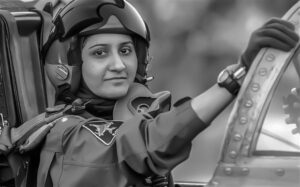
Ayesha Farooq holds the distinction of being the first female war-ready fighter pilot in Pakistan and South Asia. Among the 19 women who have achieved pilot status in the Pakistan Air Force in the last decade, she stands as a trailblazer in her field. Her achievements mark a significant milestone in breaking gender barriers in traditionally male-dominated fields. One of the most significant milestones in Ayesha’s career was her qualification as a “Mission Commander.” This designation signifies her ability to lead combat missions independently, showcasing her expertise in aviation, navigation, and tactical decision-making.
Beyond her technical achievements, Ayesha Farooq’s presence in the Pakistan Air Force has contributed to changing the perception of women’s roles in the military. Her dedication and success have paved the way for more women to pursue careers in the armed forces and aviation, challenging traditional notions and breaking new ground for gender equality. Ayesha’s journey continues to inspire young women across Pakistan and beyond. Her story sends a powerful message that with determination, hard work, and a relentless pursuit of one’s goals, barriers can be overcome and ceilings shattered. Ayesha Farooq’s achievements are a source of pride not only for her country but for women everywhere who aspire to make their mark in traditionally male-dominated fields.
Conclusion
It is evident that Pakistan is home to a multitude of unsung heroines, each with their unique stories of resilience, determination, and transformative impact. While this exploration has highlighted a select few, it is crucial to acknowledge that countless other women have made substantial contributions to Pakistan’s history and the world at large. From challenging societal norms to spearheading social reforms, from advocating for women’s rights to excelling in diverse fields, these unsung heroines have changed the world with their indomitable spirit and unwavering commitment. Their achievements stand as a testament to the potential for greatness that resides within every individual, and their stories continue to inspire generations to envision a more inclusive, equal, and empowered future.
This article is written by Haneen Gul. Haneen is a research analyst at the Iqbal Institute of Policy Studies (IIPS).
References
Amir, S., & Ali, R. B. (2014, January 12). Pakistan’s unsung heroes: The silent crusaders. Retrieved from The Express Tribune: https://tribune.com.pk/story/655998/pakistans-unung-heroes-the-silent-crusaders
AYESHA FAROOQ. (2018). Retrieved from Pride of Pakistan: https://www.prideofpakistan.com/who-is-who-detail/Ayesha-Farooq/414
Kiran, N. (2020, August 29). FATIMA BEGUM: A NARRATIVE OF UNSUNG HERO OF PAKISTAN MOVEMENT. ResearchGate. Retrieved from https://www.researchgate.net/publication/343963530_FATIMA_BEGUM_A_NARRATIVE_OF_UNSUNG_HERO_OF_PAKISTAN_MOVEMENT
NBP. (2018). NBP Pays Tribute to the UNSUNG Heroes of our Country! Retrieved from National Bank of Pakistan: https://www.nbp.com.pk/UnSungHeroes/
Nisar, A. (2020). Women of Pakistan — 73 Years of Resilience. Retrieved from Hilal for Her: https://www.hilal.gov.pk/her-article/detail/NDE1Mw==.html
Pakistani Women Who Have Made History. (2021, March 14). Retrieved from Eco Cultural Institute : https://www.ecieco.org/en/news/6721/Pakistani-Women-Who-Have-Made-History
The Agha Khan University. (2014, November 13). Ayesha Farooq Soaring high, a flight to success. Retrieved from https://www.aku.edu/events/sls/Pages/ayesha-farooq.aspx
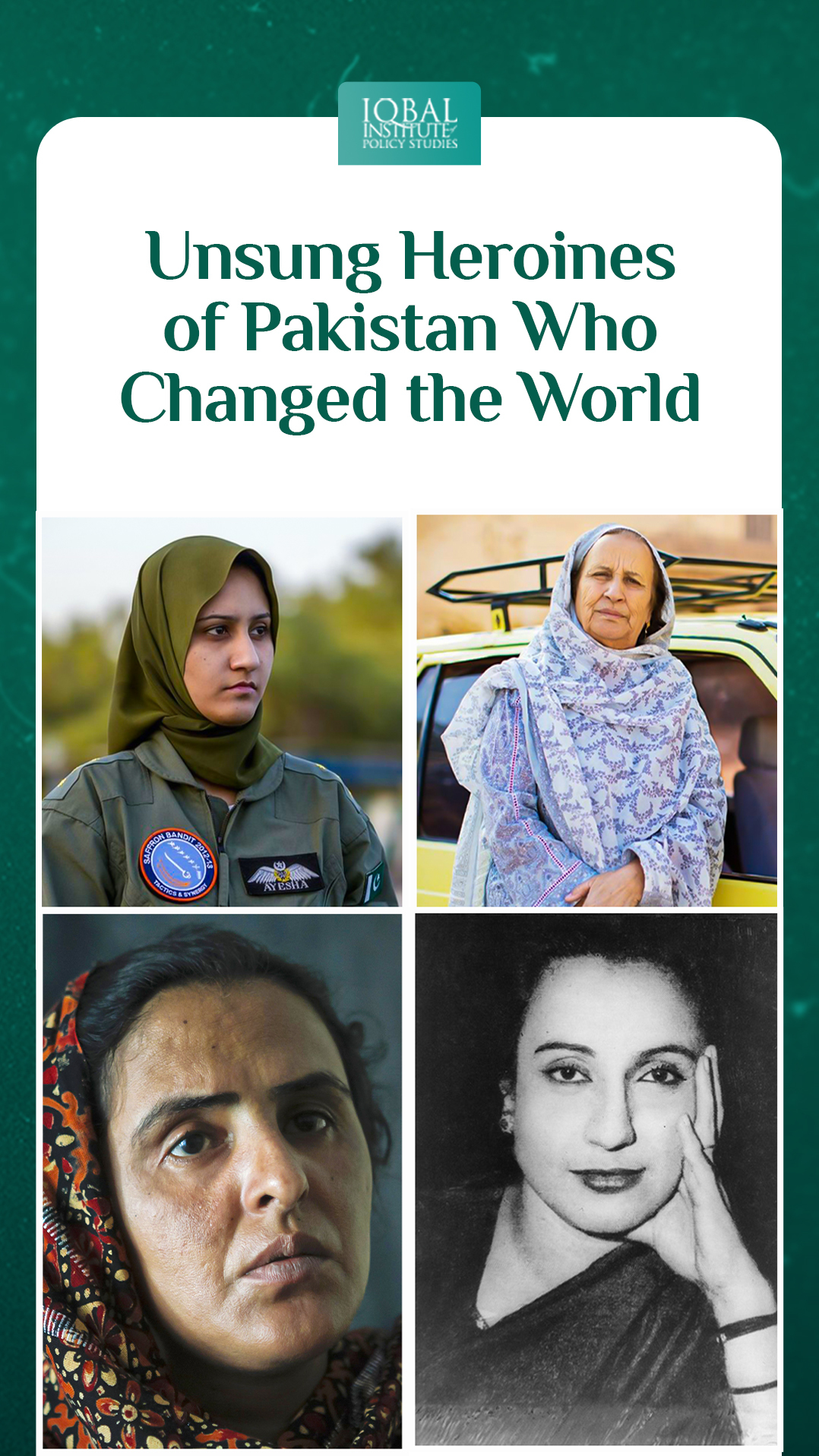


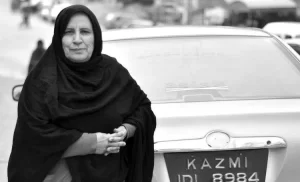
Leave a Reply